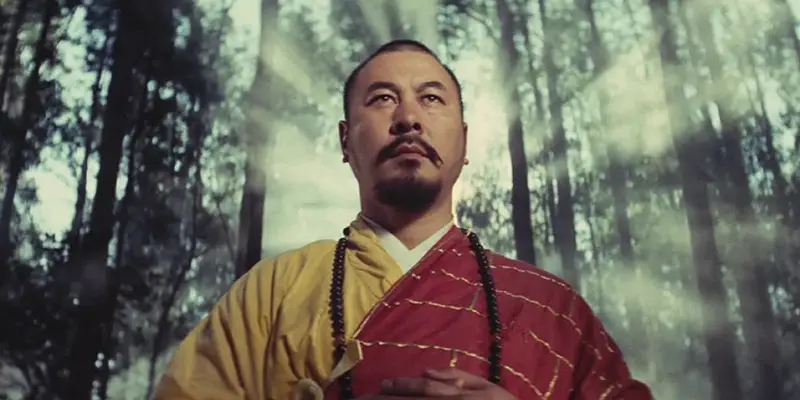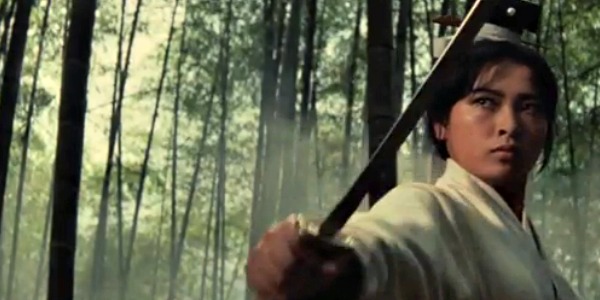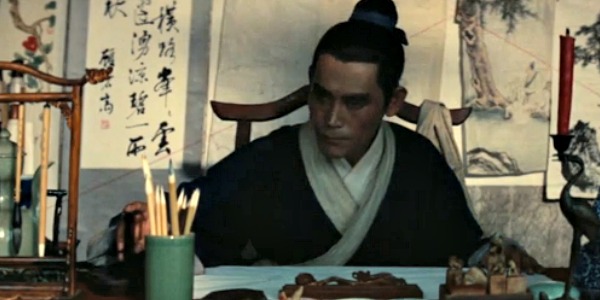A TOUCH OF ZEN: Cosmic Beauty In Discipline

Ben is a former student of cognitive science who is…
The new Criterion Collection release of wuxia films, Hu was neither a Buddhist nor a martial artist; but, he believed that capturing an experience of Zen would make for a strong film.
Obviously, understanding a director’s intentions doesn’t always tell you much about a film. Even so, I think Hu‘s stated goals speak to what it’s like to watch A Touch of Zen. The characters concern themselves with political intrigue and personal drama, and they mostly don’t speak of Zen. Despite this, it always feels as though the film is operating in service of a grand, essential ideal, and that the characters – consciously or unconsciously – play a role in that.
The battle that takes place in A Touch of Zen is not so much between political factions vying for power, but more between two systems of social order. Each offers power in exchange for discipline. One respects the intrinsic nature of things in the world, and involves the practice of awareness and asceticism. The other attempts to replace and dictate the nature of the world so that corrupt people can claim dominance.
The Moon Doesn’t Drink
The film opens with spiders on their webs, followed by majestic, mountainous landscapes. Then, we see ruins of abandoned war fortresses, the dilapidated remains of people’s attempts to claim space for themselves. Humans have only a limited place in A Touch of Zen‘s world. They aren’t dwarfed or rendered insignificant; rather, they have to share space with other things, non-human presences which manifest as inky black shadows and shafts of light passing through mist. The characters struggle to abide this as they navigate sloping topography and contrasting planes of action.
It feels like they have a natural place in the world, and therefore that they have some kind of intrinsic nature. They struggle to realize that nature manifests as a struggle with their surroundings. Throughout the film’s first hour, the characters constantly make self-conscious attempts to be unobtrusive. They strive to be in alignment with their surroundings; they struggle to move against heavy vegetation, worry about intruding on the territory of angry ghosts, and speak in deferential terms when they talk to people from outside their own families.

When the first fight breaks out, it reveals the characters’ grace and immense control over their own bodies. The fight scenes in A Touch of Zen are about elegance and skill as much as they’re about violence. The strongest fighters’ mastery makes them freer within their environments. When the protagonists face off with government officials in a bamboo forest, they gain the upper hand by utilizing the height and flexibility of the bamboo stalks. Their enemies, meanwhile, see the stalks as obstacles; they have to break away from the fight to cut them down.
Because of A Touch of Zen’s rich colors and the incidental beauty of its landscapes, there’s a sense of serenity and spirituality when characters attain balance in their natural state. The film’s most breathtaking imagery is precipitated by the appearance of Buddhist monks in the final act, the wisest and most powerful of all the characters.
Their leader, Abbot Hui, is able to exert an almost supernatural influence over others. In one scene, the film depicts his power by setting him against the sun. He exercises his power by moving to allow the sun’s rays to shine past him. It draws a connection between his power and his awareness of the environment, as well as his understanding of his own place therein.
Transient Tyranny
A Touch of Zen treats political conflict as something more temporary and narrow than the means of spiritual fulfillment. However, that doesn’t mean its political conflict is irrelevant. In fact, the characters’ need to negotiate a social hierarchy becomes a pressing issue because it plays into how the antagonists stray from spirituality. It makes them seem like cosmic criminals, imposing structure onto the world which prevents people from achieving fulfillment and damages interpersonal relationships.

This is perhaps unsurprising: the film is based on a story by 17th Century Chinese scholar Pu Song-ling, whose writing was critical of corruption he saw in society, and of the imperial civil service exam (an exam required for those who wanted to become public officials in China until the 20th Century). The exam becomes a burden on Gu Sheng-Tsai, one of A Touch of Zen‘s main characters.
Gu would be perfectly happy if only people would stop pressuring him to take the exam, but they don’t back off no matter how many times he refuses. Later, we find that one of these people is a high-ranking agent of a corrupt secret police force. He only wanted Gu to take the exam to prevent him from interfering with his organization’s plans.
The agent doesn’t seem as beholden to social mores as the other characters; he’s a little more assertive, and he enters other people’s homes uninvited. Likewise, his superiors manipulate social mandates to gain an upper hand against their enemies, obliging them to walk into traps. Their methods are official and seemly – but behind closed doors, they’re violent and cruel. The way they manipulate structure is out of step with the natural order.
A Touch of Zen condemns not only the actions of corrupt public officials and secret police forces but also the blind respect they receive based on societal expectations. Gu’s mother insists that becoming a public official is the highest honor a man can achieve. Part of the reason it’s easy for the authorities to abuse their power is that people accept such beliefs as a matter of course.
Like many wuxia films (including Hu‘s previous two films Dragon Inn and Come Drink with Me), A Touch of Zen has the heroes battle all kinds of enemies before finally facing one who’s far more powerful than the rest. However, the result of their final face-off isn’t as conclusive as you might expect; A Touch of Zen has a strangely open ending. I won’t go into too much detail, but it leaves a lot unsaid and unsolved – or perhaps more accurately, it leaves behind the world it inhabits, suggesting that the only solution is for the characters to accept a major paradigm shift.
To Conclude
Like the old Buddhist told King Hu: Zen is something to be experienced. A Touch of Zen is over three hours long, so it demands a significant commitment of time. But it’s not esoteric. It has the same immediate effect as other martial arts films, and augments it with the similarly immediate appeal of stunning natural beauty and a supernatural sense of mystery.
The film’s scale makes it a little distant from the human drama at the beginning of the story, but it makes up for it by giving the impression that we’re witnessing a battle between cosmic forces.
What do you think sets wuxia films apart from other kinds of action films?
A Touch of Zen is available on Blu-ray and DVD from The Criterion Collection as of July 19, 2016. It is also available for streaming on Amazon Instant Video.
Does content like this matter to you?
Become a Member and support film journalism. Unlock access to all of Film Inquiry`s great articles. Join a community of like-minded readers who are passionate about cinema - get access to our private members Network, give back to independent filmmakers, and more.
Ben is a former student of cognitive science who is currently trying to improve his writing style and ability to understand and appreciate films containing unfamiliar perspectives. He tries not to hold films to a strict set of criteria, but does believe that strong movies can change your outlook on the world. His favorite films include Whisper of the Heart, Hellzapoppin', Foolish Wives, 42nd Street, and the work of Charlie Chaplin.











